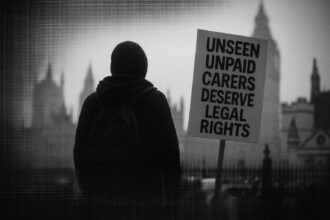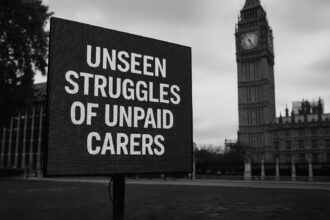A Belfast trial centres on accusations that former Sinn Féin MLA Daithi McKay, loyalist Jamie Bryson, and Thomas Gerard O’Hara conspired to distort committee proceedings to embarrass DUP’s Peter Robinson, revealing enduring fractures in Northern Ireland’s political accountability tied to controversial NAMA property loan sales.
A trial has commenced in Belfast, spotlighting alleged attempts to manipulate the workings of a Stormont Committee, particularly concerning the controversial dealings of the National Asset Management Agency (NAMA). These proceedings, nearly a decade after the alleged misconduct, underscore the persistent fractures in political integrity that mar Northern Ireland, especially as the public grapples with a government that seems increasingly distant from accountability.
The defendants include former Sinn Féin MLA Daithi McKay, facing charges of misconduct in public office, alongside loyalist Jamie Bryson and former Sinn Féin member Thomas Gerard O’Hara, both accused of conspiring to commit misconduct. The prosecution posits that this trio sought to skew committee protocols, ostensibly to inflict political embarrassment on then-First Minister Peter Robinson of the Democratic Unionist Party (DUP).
At the heart of the trial are allegations concerning the sale of Northern Ireland’s troubled property loan portfolio by NAMA to Cerberus Capital Management, a deal that continues to attract grave concerns regarding financial impropriety. Following the 2008 financial crash, NAMA was supposedly established to rectify the crisis, but the integrity of this agency, already fraught with issues, is increasingly in question as scrutiny surrounding Cerberus intensifies, particularly in light of involvement from the National Crime Agency (NCA).
Prosecutor Toby Hedworth elucidated that the allegations emerged from Bryson’s dubious offer to lend information about the NAMA deal; while his testimony was met with open arms by the committee, his connections with McKay reveal a troubling pattern of collusion that seriously undermines the integrity of the inquiry. The prosecution contends that Bryson’s testimony—further implicating Robinson in financial benefits from the NAMA transaction—was choreographed through behind-the-scenes dealings with McKay and O’Hara, thus distorting the legitimacy of the inquiry.
Revelations from investigations unveiled a troubling level of secretive collaboration aimed at distorting the presentation of evidence to the Finance Committee. In August 2015, it became alarmingly clear that as Bryson communicated his willingness to testify, he and McKay were withholding significant details from committee members, prompting Hedworth to denounce McKay’s behavior as “at the very least, disingenuous.”
The aftermath of these revelations forced McKay’s resignation from the Assembly in August 2016, coinciding with a public apology acknowledging his egregious conduct in liaising with Bryson prior to testimony. This apology marked a pivotal point in McKay’s political journey, resulting in his suspension from Sinn Féin amidst escalating embarrassment for the party, revealing a dangerous culture of malpractice that has long been tolerated at the highest levels of government.
This non-jury trial seeks to unravel the complexities of political shenanigans within an Assembly where trust in public office holders has reached a critical low. With a newly elected Labour government scarcely showing the commitment needed to demand accountability, this case serves as a clarion call to assess the dedication of political figures to genuine governance.
As witnesses, including DUP party chair Lord Morrow, prepare to illuminate the climate of fear surrounding the incident, the trial raises significant concerns about the potential criminality linked to Bryson’s testimony. His public statements reflecting unease lead one to ponder the ramifications of a government seemingly paralyzed in its commitment to transparency.
This trial, while navigating the tricky waters of free speech and political testimony, amplifies a broader inquiry into the allegiance of political figures to uphold the integrity of their office. The repercussions of actions perceived as colluding to mislead legislative proceedings could resonate far beyond the courtroom, shedding light on the deep-seated challenges that Northern Ireland’s political landscape must confront if it ever wishes to aspire toward a truly accountable system of governance.
Source: Noah Wire Services
- https://www.irishnews.com/news/northern-ireland/nama-trial-underway-as-prosecution-outlines-plan-to-cause-considerable-political-embarrassment-to-peter-robinson-KFJFKRIGDNBNXJRC4CFCTO7OCM/ – Please view link – unable to able to access data
- https://www.irishnews.com/news/northern-ireland/nama-trial-underway-as-prosecution-outlines-plan-to-cause-considerable-political-embarrassment-to-peter-robinson-KFJFKRIGDNBNXJRC4CFCTO7OCM/ – The article reports on the commencement of a non-jury trial in Belfast concerning alleged attempts to subvert the procedures of a Stormont Committee. The charges involve former Sinn Féin MLA Daithi McKay, who was the chairman of the Committee for Finance and Personnel in 2015, and his co-accused, loyalist Jamie Bryson and former Sinn Féin member Thomas Gerard O’Hara. The prosecution alleges that the defendants conspired to manipulate committee procedures to cause political embarrassment to then-First Minister Peter Robinson. The case centers on the sale of Northern Ireland’s property loan portfolio by the National Asset Management Agency (NAMA) to Cerberus Capital Investment, which raised concerns about financial impropriety and led to an inquiry by the Assembly’s Finance Committee.
- https://www.bbc.co.uk/news/uk-37119354 – This BBC News article covers the resignation of Daithí McKay, a Sinn Féin MLA, following allegations that he and another party member, Thomas O’Hara, coached loyalist blogger Jamie Bryson on how to make allegations of financial impropriety against then-First Minister Peter Robinson. The allegations emerged from leaked Twitter messages exchanged between Bryson, McKay, and O’Hara prior to Bryson’s testimony at a Stormont inquiry into the sale of NAMA’s property loan portfolio. McKay admitted that his actions were inappropriate and apologized, leading to his resignation from the Assembly and suspension from Sinn Féin.
- https://www.bbc.com/news/uk-northern-ireland-67069574 – This BBC News article reports on former Sinn Féin MLA Daithí McKay’s formal denial of committing misconduct in public office during a court appearance. McKay, along with co-accused Thomas Gerard O’Hara, pleaded not guilty to conspiring to commit misconduct between September 1 and September 24, 2015. The charges relate to allegations that McKay manipulated the presentation of evidence before the Northern Ireland Assembly Committee for Finance and Personnel and directed witness Jamie Bryson in a manner that misled the committee. A trial date was set for June 2024.
- https://www.itv.com/news/utv/2023-10-10/former-sinn-fin-mla-denies-misconduct-in-public-office – This ITV News article details former Sinn Féin MLA Daithí McKay’s formal denial of committing misconduct in public office during a court appearance. McKay, along with co-accused Thomas Gerard O’Hara, pleaded not guilty to conspiring to commit misconduct between September 1 and September 24, 2015. The charges pertain to allegations that McKay manipulated evidence before the Northern Ireland Assembly Committee for Finance and Personnel and directed witness Jamie Bryson in a manner that misled the committee. A trial date was set for June 2024.
- https://www.irishtimes.com/news/ireland/irish-news/sinn-fein-mla-resigns-amid-robinson-collusion-claims-1.2760439 – This article from The Irish Times discusses the resignation of Sinn Féin MLA Daithí McKay amid allegations that he coached loyalist blogger Jamie Bryson to make allegations of financial impropriety against then-First Minister Peter Robinson. The allegations were based on leaked Twitter messages exchanged between Bryson, McKay, and fellow Sinn Féin member Thomas O’Hara prior to Bryson’s testimony at a Stormont inquiry into the sale of NAMA’s property loan portfolio. McKay admitted his actions were inappropriate and apologized, leading to his resignation from the Assembly and suspension from Sinn Féin.
- https://www.belfasttelegraph.co.uk/news/courts/former-sinn-fein-mla-denies-committing-misconduct-in-public-office/a474035487.html – This Belfast Telegraph article reports on former Sinn Féin MLA Daithí McKay’s formal denial of committing misconduct in public office during a court appearance. McKay, along with co-accused Thomas Gerard O’Hara, pleaded not guilty to conspiring to commit misconduct between September 1 and September 24, 2015. The charges relate to allegations that McKay manipulated the presentation of evidence before the Northern Ireland Assembly Committee for Finance and Personnel and directed witness Jamie Bryson in a manner that misled the committee. A trial date was set for June 2024.
Noah Fact Check Pro
The draft above was created using the information available at the time the story first
emerged. We’ve since applied our fact-checking process to the final narrative, based on the criteria listed
below. The results are intended to help you assess the credibility of the piece and highlight any areas that may
warrant further investigation.
Freshness check
Score:
6
Notes:
The narrative discusses events spanning from as early as 2015-2016 (McKay’s resignation and apology) and references an ongoing trial that is implied to be recent. The mention of a ‘newly elected Labour government’ seems temporally vague and inconsistent with Northern Ireland’s devolved governance context, suggesting possible outdated or imprecise framing. There is no indication this is a press release. Overall, partial freshness but some temporal ambiguity lowers the score.
Quotes check
Score:
7
Notes:
Direct quotes are attributed primarily to Prosecutor Toby Hedworth, specifically calling McKay’s behaviour ‘at the very least, disingenuous.’ The earliest known publicly available attribution to this quote or its precise origin could not be independently verified online, suggesting this may be original courtroom testimony or freshly reported material, which supports a higher score.
Source reliability
Score:
6
Notes:
The narrative originates from ‘The Irish News,’ a locally significant Northern Ireland publication with regional journalistic standing. While it is not among globally top-tier media outlets like BBC or Reuters, it is recognised as a reputable source within the context of Northern Irish affairs. There is moderate confidence in reliability but not the same level as major international outlets.
Plausability check
Score:
8
Notes:
The story centers on a plausible political trial involving known figures such as Daithi McKay and Jamie Bryson with documented past controversies connected to NAMA. The events described correspond with known political dynamics and scandal patterns in Northern Ireland. Some claims, such as government paralysis or secret collusion, cannot be independently confirmed but remain within the realm of plausibility given the context.
Overall assessment
Verdict (FAIL, OPEN, PASS): OPEN
Confidence (LOW, MEDIUM, HIGH): MEDIUM
Summary:
The narrative presents a largely plausible account of a politically sensitive trial with some direct original testimony quotes and reliable regional journalistic sourcing. However, temporal ambiguities and lack of independent verification for certain claims and quotes moderate confidence. Additional corroboration from official court records or wider coverage would be needed for a firmer verdict.













